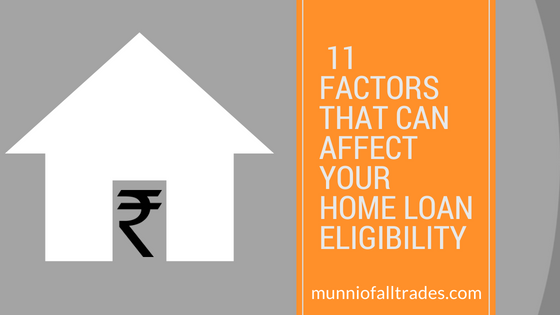The first step towards your dream home is getting to know the eligibility criteria of a home loan. Banks and financial institutions have several criteria on which they evaluate a prospective loan. We have come up with a comprehensive list of 11 factors that affect your home loan eligibility.
1. Age
The tenure for any home loans easily ranges from 10 to 30 years. This tenure is determined on the basis of your age. Your age helps a bank determine your ability to repay a loan as well as the time period that should be allocated to you. The younger you are, the easier it is to get a loan for a longer period of time.
2. Profession
If you are a salaried employee, it is advisable to have around 3 to 4 years of work experience when you apply for a home loan. If you are an entrepreneur, the bank may go through your company’s tax returns for the last few years to evaluate your revenues and profits.
3. Type of employment
Your type of employment along with the stability of your job or your business becomes an important criterion for banks. Frequent changes in employment or work is often a red flag for lending institutions.
4. Total income
The higher your income, the easier it is for you to access a home loan. Higher income also makes you eligible for a higher loan as banks for a greater confidence in your ability to repay the loan.
5. Dependents
Your dependents play an important role in determining the loan amount that you would be eligible for. The simple reason for this is that direct dependents mean higher expenditure, which reduces the overall income you have to repay your loan. Lenders calculate something called FOIR i.e. Fixed Obligation to Income ration while sanctioning a loan.
6. CIBIL Score and Report
This is one of the most important 11 factors that affect your home eligibility. CIBIL score is a 3-digit number that summarizes your credit history. The score depends on your payment history across different loans that you may have taken throughout the year. A score of 750 and above is important, as it is an indication that you have completed your loan repayments in a timely manner. If your credit score is lower, there are chances that you might have to pay a higher interest but you wouldn’t be denied of the loan completely.
7. Property title
The home that you are looking to invest in must not have any legal issues around it. Once you make the payment, you should be the sole, undisputed owner of the property. It is suggested that you consult a lawyer to ensure that there are no legal issues.
8. Location of your home
Your new home essentially is a collateral for the bank in case you are unable to repay the loan. The difference between the market value of your home today and the predicted value of the home depends upon its location. Banks evaluate the value of your home before sanctioning the money.
9. Your property’s age
Banks avoid lending money for older properties. Similarly, for properties under construction, the bank requires documents to evaluate the construction period and whether all legal documents are available.
10. Any other loans
DSCR or Debt Service Coverage Ratio indicates the pending loans that you might have in comparison to your total monthly income. If you have several existing loans, then the risk for any lending institution becomes high. You should consider using home loan EMI calculator that is available online to get a broad sense of what you would require to repay every month along with your current outstanding loans.
11. Down Payment
A bank will finance only 80% of the total value of your loan. The balance amount has to be raised by you to make the down payment. This down payment indicates that you have healthy savings and would be able to repay the loan.
These are the 11 Factors that can affect your Home Loan Eligibility in India. I hope you found the list helpful and that it will come in handy when you apply for your loan. Do write to me if you have any queries 🙂

 We remember the day seven years back when were travelling in a Mumbai local trying hard to come up withe a name for our blog when struck us; Khushboo was always called a Jack of all Trades. The name stuck (with a slight modification, of course) and Minni was born. Six years, over 100 collaboration, lakhs of readers and several awards later; our love for blogging continues to grow. We continue to write on an eclectic range of topics from the funniest autorickshaw signs that we have spotted in Mumbai to how to bathe an elephant. We are true blue Munni of all Trades and we hope to continue on this joyride with our fellow Munnies and Munnas.
We remember the day seven years back when were travelling in a Mumbai local trying hard to come up withe a name for our blog when struck us; Khushboo was always called a Jack of all Trades. The name stuck (with a slight modification, of course) and Minni was born. Six years, over 100 collaboration, lakhs of readers and several awards later; our love for blogging continues to grow. We continue to write on an eclectic range of topics from the funniest autorickshaw signs that we have spotted in Mumbai to how to bathe an elephant. We are true blue Munni of all Trades and we hope to continue on this joyride with our fellow Munnies and Munnas. 